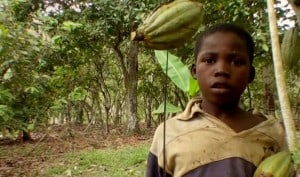
By: Pratap Chatterjee,
Eight years after they sued Archer Daniels Midland (ADM), Cargill and Nestlé for allegedly forcing them to work as child labor on a Côte d’Ivoire cocoa plantation, three young men from Mali have won a small victory – the ability to be heard in a California court.
The lawsuit was first filed as a class action to represent thousands of former plantation workers in July 2005 by the Washington-based International Labor Rights Fund (ILRF) and Global Exchange, which is based in San Francisco. The non-profit organizations recorded videotape testimony from the three specific individuals who stated that they had been lured across the border between 1994 and 2000 with the promise of easy work and good wages.
“Plaintiffs, aged 12 to 14 when first forced to work as child slaves, had to work 12 to 14 hour days with no pay. They often worked with guns pointed at them, and were given only the bare minimum of food scraps,” write their lawyers in the complaint. “Plaintiffs were locked in small rooms at night with other child slaves so they could not escape the plantations. They were whipped and beaten by the guards and overseers when the guards felt they were not working quickly or adequately.”
“I tried to run away but I was caught … as punishment they cut my feet and I had to work for weeks while my wounds healed,” one of the three boys is heard saying on video tape. All three are now adults living in the city of Sikasso, Mali, after escaping slave-like conditions on plantations in Abobogou and Region de Man in Cote d’Ivoire.
The lawsuit has its origins in a 1997 report by the UN Children’s Fund (UNICEF) that estimated that some 200,000 children are smuggled across borders in West African countries like Benin, Burkina Faso, Mali and Togo. A later U.S. State department report estimated that some 15,000 children between the ages of 9 and 12 were forced to work as on cocoa, coffee, and cotton farms in northern Cote d’Ivoire.
After media reports documented such cases in 2001, Nestlé and other major chocolate producers signed a six point agreement with the International Labor Organization in 2001 that they would ensure that their products to be made without slave labor by July 1, 2005.
In 2005 Global Exchange and ILRF’s investigations found that the companies had failed to fulfill their promises.
“Nestlé crossed a very bright line and proceeded in bad faith,” Terrence Collingsworth, executive director of ILRF told Forbes magazine. “It’s clear the only way they are going to change is if they get smacked.”
An amended complaint was filed on July 22, 2009, accusing the three companies of being complicit in the slave trade: Cargill from Minneapolis which buys cocoa beans and operates a cocoa processing plant in Côte d’Ivoire; ADM of Decatur, Illinois, which imports cocoa and manufactures chocolate-based products in factories in California; and Nestlé from Switzerland, which markets chocolate products in the U.S.
The plaintiffs argued that the case could not be heard in Côte d’Ivoire because courts there are “notoriously corrupt” or Mali because it lacked basic laws.
The lawsuit hit a roadblock in 2010 when U.S. District Judge Stephen Wilson dismissed the case saying that U.S. laws did not allow corporations to be sued in for abuses abroad.
However, in April last year, when the U.S. Supreme Court dismissed a case against Royal Dutch Petroleum for human rights abuses in Nigeria, the court ruled that lawsuits against corporations for abuses overseas could be brought in U.S. courts in specific circumstances.
Based on that ruling, Dorothy Nelson and Kim Wardlaw, two appeals court judges, ruled on December 19 that the plaintiffs should be allowed to show that the defendants fulfilled the “actus reus” standard for aiding and abetting a crime.
(The Business & Human Rights Resource Center has a full set of documents on the case here)

